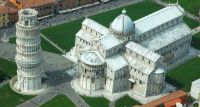PISA SEARCH ENGINE
The Square, reserved for pedestrians and covered by a large lawn, took the final appearance only in the nineteenth century, especially by the architect Alessandro Gherardesca, who became interested in the restoration of the famous monuments.
The tower, the leaning bell tower of the world's most famous monument as well as universally known, was begun in 1173 and began to tilt to the side in 1274 before it was completed the third order.
Pisa, Torre and DuomoL'inclinazione is due to the sandy silt soil of the underlying foundations, just three meters deep. Following the consolidation work carried out in the 90s of last century, the slope was reduced by about 40 cm and the monument was reopened to the public, albeit with more limited means of access than ever before.
The core of the complex is the Duomo, the magnificent marble cathedral dedicated to Santa Maria Assunta. Started in 1063, the building has a Latin cross with five aisles, which was proclaimed Primatial Church when, in 1092, Pope Urban II bestowed the title of Primate Archbishop Daiberto, now a formal award.
The Baptistery, dedicated to St. John the Baptist, stands opposite the west facade of the Duomo. Successor to an earlier Baptistery, the smallest, which was located north of the Cathedral. Inside has an unusual cone dome that covers only the inside turn of pillars. The circumference of 107.25 m makes it the largest baptistery in Italy and the world.
Pisa, Monumental Cemetery, internoIl Monumental Cemetery is located on the northern edge of the square. Legend has it that it was built around a layer of earth brought from the Holy Land in Pisa to the sea after the Second Crusade (XII century). The structure is that of a rectangular cloister in the Gothic style.
After the Second World War an artillery shell fell on the lead roof causing the melting and casting along the perimeter walls, covered with beautiful frescoes.
The preparatory drawings for frescoes, discovered at the time of their posting, they are now on display in the Museum of Sinopia, situated in the hospital in the thirteenth century on the south side of the square.
The tower, the leaning bell tower of the world's most famous monument as well as universally known, was begun in 1173 and began to tilt to the side in 1274 before it was completed the third order.
Pisa, Torre and DuomoL'inclinazione is due to the sandy silt soil of the underlying foundations, just three meters deep. Following the consolidation work carried out in the 90s of last century, the slope was reduced by about 40 cm and the monument was reopened to the public, albeit with more limited means of access than ever before.
The core of the complex is the Duomo, the magnificent marble cathedral dedicated to Santa Maria Assunta. Started in 1063, the building has a Latin cross with five aisles, which was proclaimed Primatial Church when, in 1092, Pope Urban II bestowed the title of Primate Archbishop Daiberto, now a formal award.
The Baptistery, dedicated to St. John the Baptist, stands opposite the west facade of the Duomo. Successor to an earlier Baptistery, the smallest, which was located north of the Cathedral. Inside has an unusual cone dome that covers only the inside turn of pillars. The circumference of 107.25 m makes it the largest baptistery in Italy and the world.
Pisa, Monumental Cemetery, internoIl Monumental Cemetery is located on the northern edge of the square. Legend has it that it was built around a layer of earth brought from the Holy Land in Pisa to the sea after the Second Crusade (XII century). The structure is that of a rectangular cloister in the Gothic style.
After the Second World War an artillery shell fell on the lead roof causing the melting and casting along the perimeter walls, covered with beautiful frescoes.
The preparatory drawings for frescoes, discovered at the time of their posting, they are now on display in the Museum of Sinopia, situated in the hospital in the thirteenth century on the south side of the square.
PISA Square of Miracles
Share page:


